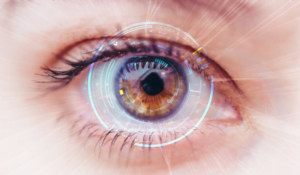
Even though sleeping with contact lenses may seem easy, it’s important to be aware of the risks involved. This article will discuss the dangers of sleeping with contact lenses and how doing so can result in eye infections and irreversible vision loss. Let’s explore the factors that make it so important to prioritize your eye health and properly care for your contact lenses.
The Dangers of Wearing Contact Lenses at Night {#risks-of-sleeping-with-contact-lenses}
- A higher chance of eye infections: Your eyes naturally generate fewer tears as you sleep. Tears are essential for keeping the eyes healthy and free of dangerous microorganisms. As a result of dirt and germs being trapped between your contact lens and your eye’s surface while you wear them over night, bacteria can flourish in this environment. This may result in a number of eye illnesses, including Pseudomonas aeruginosa infections.
- Pseudomonas aeruginosa Infection Danger: Pseudomonas aeruginosa is a harmful bacterium that can infect the skin, eyes, and respiratory system. One of the most concerning effects of this bacterium’s eye infection is irreversible eyesight loss, which can have serious repercussions. Any wounds or scratches on the cornea’s surface, which is particularly prone to infection, serve as a pathway for germs.
- Rapid Infection Spread: Once inside the eye, Pseudomonas aeruginosa can quickly proliferate and spread to other areas of the eye. An infection has the ability to cause considerable corneal damage and inflammation within just 24 hours, which could result in blindness. Due to the illness’s rapid progression, it’s imperative to stay away from any circumstance that can encourage the growth of the infection, such as sleeping in contact lenses.
- Significant Issues – Ocular ulcers: A corneal infection can lead to painful corneal ulcers, which are open sores. If ignored, they can cause serious eye injury and possibly even irreversible vision loss. You may protect your eye health and lower your chance of developing corneal ulcers by taking off your contact lenses before night.
Put Your Eye Health First (# put-your-eye-health)
Follow these crucial advice to protect your eyes’ health and reduce the chance of infections and other issues:
- Frequently Scheduled Eye Exams: For thorough eye exams, schedule regular appointments with your eye care provider. These tests can identify any possible problems early and enable prompt management.
- Follow the directions for lens cleaning: Observe the lens-care regimen that your eye doctor has advised. This includes handling your contact lenses with care during cleaning, disinfection, and storage.
- Don’t Wear Long: Avoid wearing your contact lenses for prolonged periods of time, particularly while sleeping, unless your eye care provider specifically advises it.
- Maintaining Good Hygiene: Wash your hands before handling your contact lenses, and try to avoid contacting them with your hands that are moist or dirty.
- Replace as Advisable: Your eye care provider’s recommended replacement schedule should be followed while changing your contact lenses. The risk of eye infections can increase when using outdated or damaged lenses.
Conclusion
In light of the above, it can be concluded that sleeping in contact lenses is a harmful habit that can have negative effects on your eye health. If eye infections are not treated right away, especially those brought on by Pseudomonas aeruginosa, they can cause permanent vision loss. Prioritize routine eye exams and always take off your contact lenses before bed to maintain healthy eyes and lower the risk of issues.
Frequently asked questions
It is crucial to abide by the particular instructions given by your eye doctor and the contact lens manufacturer. Not all lenses are appropriate for sleeping, even if some are made for prolonged wear. It is best to speak with a member of your eye care team before leaving contact lenses in overnight.
Depending on the type and brand of lenses you wear, different contact lens replacement schedules apply. Some lenses must be replaced everyday while others can be changed once a week or once a month. It’s essential to stick to the suggested replacement schedule if you want to keep your eyes healthy.
Redness, excessive tearing, discomfort, sensitivity to light, and blurred vision are typical indicators of an eye infection. Remove your contacts as soon as you notice any of these symptoms and get help right away from a doctor.
Your eye doctor’s prescription medication can effectively treat a variety of eye infections. To avoid problems and probable vision loss, however, early detection and treatment are crucial.
Yes, there are a number of contact lens substitutes, including glasses and corrective eye surgery. Based on your unique requirements and way of life, your eye care professional can assist you in making the optimal decision.





Recent Articles:

Alleviating Digital Eye Strain: Tips for Screen Users

The Truth About Seeing in the Dark

The Myth of Green Improving Eyesight

The Dangers of Looking Directly at the Sun

The Risks of Using Smartphones in the Dark on Eye Health

An Examination of Visual Phenomena for “Ghost Images”




